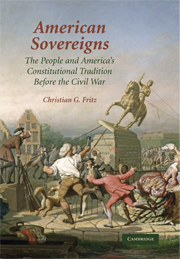Book contents
- Frontmatter
- Contents
- Acknowledgments
- 1 Prologue
- PART ONE THE PEOPLE'S SOVEREIGNTY IN THE STATES
- PART TWO THE SOVEREIGN BEHIND THE FEDERAL CONSTITUTION
- 5 The Federal Constitution and the Effort to Constrain the People
- 6 Testing the Constitutionalism of 1787: The Whiskey “Rebellion” in Pennsylvania
- 7 Federal Sovereignty: Competing Views of the Federal Constitution
- PART THREE THE STRUGGLE OVER A CONSTITUTIONAL MIDDLE GROUND
- Key to abbreviations
- Notes
- Selected Short Titles
- Credits
- Index
6 - Testing the Constitutionalism of 1787: The Whiskey “Rebellion” in Pennsylvania
Published online by Cambridge University Press: 31 January 2011
- Frontmatter
- Contents
- Acknowledgments
- 1 Prologue
- PART ONE THE PEOPLE'S SOVEREIGNTY IN THE STATES
- PART TWO THE SOVEREIGN BEHIND THE FEDERAL CONSTITUTION
- 5 The Federal Constitution and the Effort to Constrain the People
- 6 Testing the Constitutionalism of 1787: The Whiskey “Rebellion” in Pennsylvania
- 7 Federal Sovereignty: Competing Views of the Federal Constitution
- PART THREE THE STRUGGLE OVER A CONSTITUTIONAL MIDDLE GROUND
- Key to abbreviations
- Notes
- Selected Short Titles
- Credits
- Index
Summary
The summer of 1794 found President George Washington mobilizing an army to subdue opposition in western Pennsylvania to a whiskey excise tax – part of a major initiative of his administration. A call for militia from New Jersey, Pennsylvania, Maryland, and Virginia eventually formed an army of nearly 13,000 men – more troops than the general commanded during most of the Revolution. The necessity for this “resort to military coercion,” according to Washington, came from “misguided or designing men” who were attempting “to poison and discontent the minds of the people against the government; particularly by endeavouring to have it believed that their liberties were assailed.” In late September, Washington led a military expedition toward “the Country of Whiskey,” accompanied by Alexander Hamilton, his secretary of the treasury and the author of the excise.
By early October, Washington and Hamilton reached the town of Carlisle, on the eastern side of the Alleghenies, where the general inspected militia troops. From Carlisle, Washington continued westward to Fort Cumberland, making more inspections and evaluating whether to lead the troops personally over the mountains into western Pennsylvania. If the formation of the army sufficiently dissipated opposition to the excise he could return to Philadelphia, where Congress would meet in early November.
From information gathered at Cumberland, it was “evident” to Washington “that the people in the Western Counties of this State” were “very much alarmed at the approach of the Army.”
- Type
- Chapter
- Information
- American SovereignsThe People and America's Constitutional Tradition Before the Civil War, pp. 153 - 189Publisher: Cambridge University PressPrint publication year: 2007



